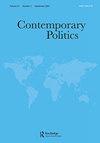Why can’t the drama stop? US–China rivalry and security triangulation on the Korean peninsula
IF 2
3区 社会学
Q1 POLITICAL SCIENCE
引用次数: 0
Abstract
ABSTRACT Why did the flurry of summitry in the Trump years to denuclearize North Korea fall short? What is the crux of the Korean security problem? To understand peninsular security, I argue that a more holistic approach is warranted to unpack and piece together the many crosscutting and overlapping security dynamics in a cogent and coherent manner. In this article, I first argue that the Korean Peninsula should be understood as a security system writ large, comprising the United States, China, and the two Koreas as indispensable players in all major issues pertaining to peninsular security. The second section introduces complex systems theory as an analytical approach that injects more sophistication and dynamic into the otherwise overly structural analysis typical of the field. The third and fourth sections reconstruct the unfolding of major events in terms of a positive feedback loop – namely, how great power realpolitik and North Korea’s provocations converged and ricocheted to cause the crisis in 2017, as well as a negative feedback loop in which triangular interactions both facilitated and obstructed US – North Korea wrangling. The conclusion offers some preliminary assessments of how things might play out in the future.为什么戏剧停不下来?中美在朝鲜半岛的竞争和安全三角关系
本文章由计算机程序翻译,如有差异,请以英文原文为准。
求助全文
约1分钟内获得全文
求助全文

 求助内容:
求助内容: 应助结果提醒方式:
应助结果提醒方式:


